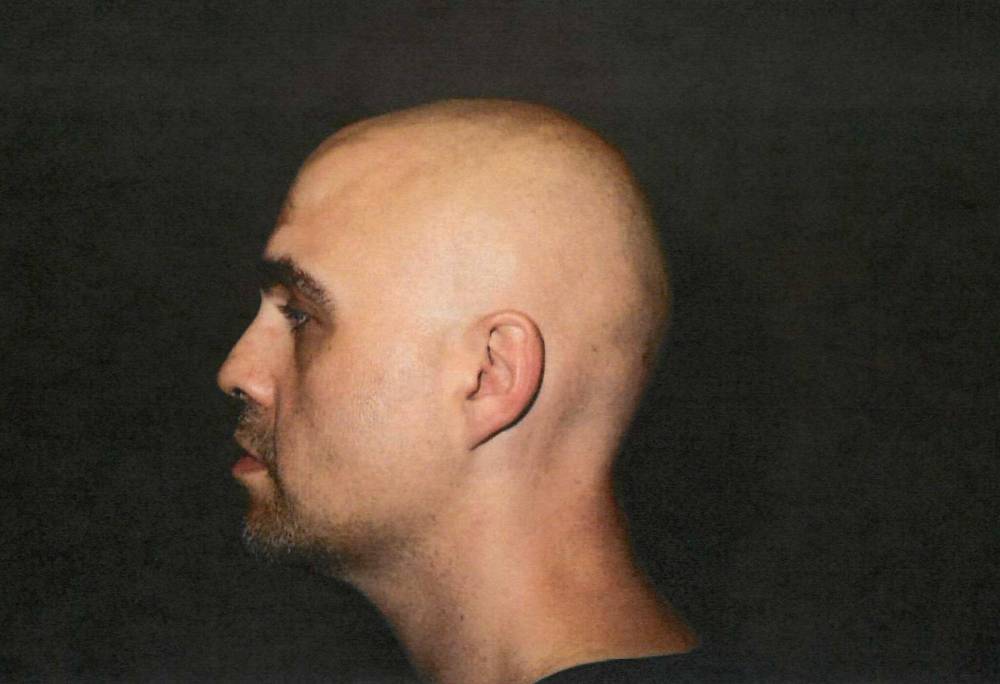One day after strangling Marcedes Myran inside his North Kildonan apartment — the third woman he had killed in the span of seven weeks — Jeremy Skibicki sat down at his computer.
“Definition of a serial killer,” Skibicki typed into Google’s search window on May 5, 2022.
Police uncovered the search and other damning online queries during a forensic examination of Skibicki’s computer following his arrest 12 days later for the murder of 24-year-old Rebecca Contois.

SUPPLIED
Photo of Jeremy Skibicki released by the court.
Skibicki, 37, has pleaded not guilty to four counts of first-degree murder in the May 2022 slayings of three Indigenous women — Contois, Myran and Morgan Harris — as well as a fourth unidentified woman who was killed on or around March 15, 2022. She has been named Mashkode Bizhiki’ikwe (Buffalo Woman) by Indigenous elders.
Skibicki has admitted he “committed an unlawful act” by killing the women, but is claiming he should be found not criminally responsible by reason of mental disorder.
In court Tuesday, Riley Johansson, a Winnipeg Police Service crime intelligence analyst, reviewed Skibicki’s online activity and social media communications around the time of the killings.
The same morning Skibicki sought the definition of a serial killer, he searched: “do Muslims behead people with knives.”
Skibicki has admitted to sexually violating all four victims after they were dead and disposing of their remains in garbage bins. Two of Skibicki’s victims — Myran and Contois — were dismembered.
Skibicki’s arrest came one day after a man searching for scrap metal found Contois’ severed head in a plastic bag inside a garbage bin on Edison Avenue, a short distance from Skibicki’s McKay Avenue suite.
The same day he killed Myran, Skibicki searched “Eternal Rest” on Wikipedia, described there as “the progression of souls of the faithful departed in Purgatory to their place in Heaven.”
“Definition of a serial killer”–Jeremy Skibicki Google search
Court has heard Skibicki frequented a homeless shelter looking for women and that security video at the shelter and other locations showed him with Harris, Myran and Contois.
Police have not been able to identify the victim known as Buffalo Woman. Investigators did not learn of her existence until two months after she was killed, by which time any area security video featuring her would likely have been erased, court has heard.
Skibicki has admitted selling a jacket belonging to the woman on Facebook Marketplace. Police recovered the jacket, which was then examined for DNA. Female DNA was found on the jacket, but it could not be matched to any DNA profile police had in their various databases.
Around the time Buffalo Woman was killed, and in the days that followed, Skibicki searched Google several times about fingerprints, DNA and how long security footage is typically kept.
“Do fingerprints show up on plastic wrap?” Skibicki asked in one search. “Does washing clothes destroy DNA?” he asked in another.
Skibicki told police he has been diagnosed with borderline personality disorder and post-traumatic stress disorder.
“Do fingerprints show up on plastic wrap?”–Jeremy Skibicki Google search
Two days after he is believed to have killed Buffalo Woman, Skibicki searched Google for “Explosive Anger Disorder.”
Skibicki made repeated searches following the killings of all four woman related to missing persons and the Bear Clan Patrol, which regularly posts notices of missing persons in Manitoba.
“The search for missing persons was (a) common trend throughout the date range of the content located on the computer extraction,” Johansson wrote in a report provided to court.
Following the slayings of Harris, Myran and Contois, Skibicki searched online to confirm when garbage was scheduled to be picked up in his area.
In testimony last week, Skibicki’s ex-wife told court he would have sex with her while she was asleep and medicated and once threatened to have sex with her corpse. The woman told court the sexually and emotionally abusive marriage ended a year later when she obtained a protection order and, eventually, moved in with her mother.
In a Facebook Messenger conversation with his ex-wife a week before Contois’ death, Skibicki told her he could end up serving three life sentences and asked her to “please forgive me if I end up going to prison for life.”
“I threw everything away because my heart broke,” Skibicki wrote. “This heartbreak brought out the worst in me. I feel irredeemable. You have no idea how far I fell.”

Victims of admitted serial killer Jeremy Skibicki (left to right): Morgan Beatrice Harris, Marcedes Myran, Rebecca Contois.
In another conversation two days later, Skibicki’s ex-wife told him: “U need to own whatever u did to whoever.”
“Yeah on my deathbed… promise, otherwise I’d never see you again,” he replied.
dean.pritchard@freepress.mb.ca

Dean Pritchard
Courts reporter
Someone once said a journalist is just a reporter in a good suit. Dean Pritchard doesn’t own a good suit. But he knows a good lawsuit.
Our newsroom depends on a growing audience of readers to power our journalism. If you are not a paid reader, please consider becoming a subscriber.
Our newsroom depends on its audience of readers to power our journalism. Thank you for your support.